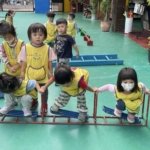We are all familiar with the saying, "Live to learn, learn to grow old", and there is another similar saying, "To live, you must move". If we combine the two phrases, it is: "Live to live, move to live, learn to move to live!"
It may not be good to keep doing the same exercise
Learning sports should be developed from both "mental" and "physical" perspectives. People explore their potential in learning, and they also explore the limits of their physical abilities in sports. However, after a certain age, the exercise behavior seems to be fixed; people who like swimming mostly take swimming as their main sport; for example, I love jogging, so I take running as my main sport.
If time and physical fitness allow, it is recommended to learn another new sport every one or two years, because when we are familiar with a certain exercise pattern, we will easily fall into the "efficiency trap". The body's exercise system will automatically develop a set of "energy-saving patterns" to accomplish the desired movements; therefore, the more beautiful the movements become, the more energy is saved, which means that the body has already developed a set of efficient movements.
Maybe you are wondering, isn't "efficient movement" good? Do you know that "too efficient movement" will make the muscle groups do not need to exert too much effort during exercise, and only move certain fixed muscle groups, so that it is not easy to achieve the "expected" effect of exercise (such as calories burned after exercise; unless you can find a way to increase the intensity of exercise, or exercise time is extended, or else you have to consider trying to learn a new exercise, and find ways to exercise other muscle groups.
Learn New Exercises to Activate New Muscle Groups
Learning new exercises can not only re-activate some neglected muscle groups, but also re-activate our motor learning loop. The latest research in sports medicine has begun to evaluate the effectiveness of exercise in preventing and treating dementia and Alzheimer's disease in the elderly, and the answer is yes.
At the end of last year, the International Journal of Geriatric Psychiatry published a study that showed the positive benefits of the exercise learning process for seniors with Alzheimer's disease; the study involved hospitalized patients who were provided with fourteen weeks of moderate to high-intensity aerobic exercise, three times a week for one hour each time. The study found that cognitive functioning was improved through exercise learning.
In this year's issue of the Journal of Geriatric Mental Health, there is a similar study: the research team designed an 18-week recommended home exercise program for seniors with dementia (average age over 84) living in hospice care facilities, allowing them to complete a set of sitting, standing, and walking exercises under the guidance of an exercise instructor.
The design of this study was not only to verify the effectiveness of the exercise program, but also to compare the effectiveness of the intervention of "exercise instructors" or "caregivers". The results confirmed that the designed program with specialized instruction had a cognitive enhancement effect on seniors suffering from dementia.
Numerous studies have supported the positive effects of exercise on dementia or Alzheimer's disease in the elderly, and even the Kirkland Evidence-Based Medicine Database, which has a reputation for rigorous scrutiny, published a systematic analysis in April of this year; utilizing an integrative analysis method, it examined seventeen experiments related to exercise and dementia in the elderly, which had been published in various journals in the past. In the end, it was found that exercise intervention is not as effective as people think.
Don't give up on exercise when you hear this news, because the final conclusion of this study is that it's good for preventing and treating dementia, but they can't find any downside to doing more exercise either. So, it's not wrong to move more when you have time, it's better to keep your mind on learning!
Man/Hsu Kam-hing (Professor, Department of Leisure and Sports Medicine, Ping Kung University)
Excerpts from Mandarin Daily





